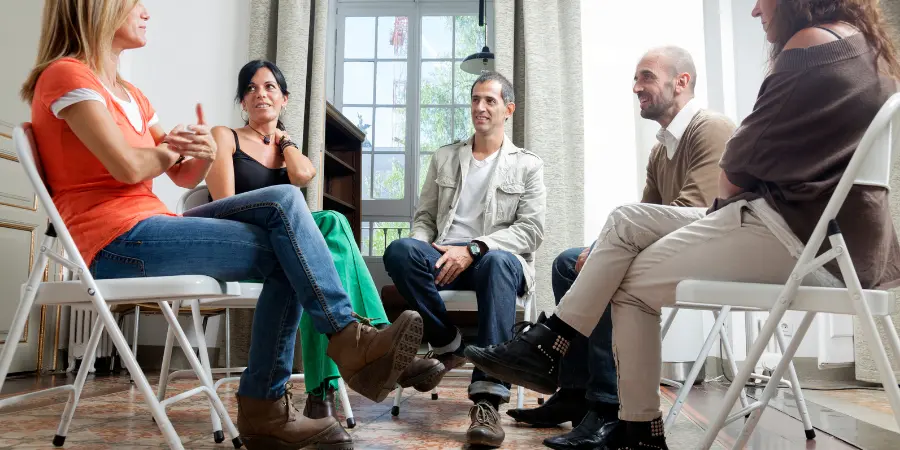This Page was last reviewed and changed on January 10th, 2023
ARFID rehab treatment
ARFID treatment at rehab is highly recommended for those suffering from ARFID (avoidant restrictive food intake disorder). Since ARFID essentially means you have an unsafe aversion to some foods or, in rare cases, all foods, ARFID can be mentally crippling, and it can disrupt every aspect of your life. Since ARFID is a lesser-known and possibly, less understood eating disorder, people may feel uncomfortable about seeking ARFID treatment. However, we at Primrose Lodge are resolute in our belief that eating disorders are mental illnesses, and all mental illnesses derive from unhealed emotions and tendencies. Please know that you aren’t alone; if you’re ready to attend ARFID treatment you will receive a comprehensive recovery programme that will help you free yourself from ARFID’s psychological binds.

What is rehab for ARFID treatment?
ARFID rehab is a specialised rehabilitation programme run by experienced professionals who provide physical and mental care to those suffering from ARFID. Skilled therapists will pinpoint the underlying reasons behind ARFID behaviour and thus provide clients with healthier coping methods to tackle such triggers. Most importantly, ARFID treatment rehab is a safe place where you can release your emotions and be vulnerable without judgement.
Do I need ARFID eating disorder treatment?
It’s easy for people to dismiss ARFID behaviours as simply ‘fussy eating’ tendencies or to assume that a person showing the most obvious physical symptoms of ARFID (fear of food, weight loss) must have anorexia. However, misdiagnosis only delays suffering further. Therefore, it’s essential to be sure of your symptoms. If you can relate to some of the statements below, it strongly indicates you need to seek ARFID eating disorder treatment.
- I have lost a lot of weight
- I refuse to eat meals with others
- I avoid social interactions where food is involved
- I don’t care if I gain or lose weight
- I am not motivated to lose weight in order to be thin
- I don’t count calories and have no interest in them
- I feel anxious whenever I am around food
- I wear baggy clothes to hide my weight loss
- My hair and skin are dry
- My nails are brittle
- I feel physically sick at the idea of eating
- I usually suffer from stomach cramps and constipation
- The appearance, texture, or smell of specific foods makes me agitated and uncomfortable
- I have uncomfortable or intrusive thoughts regarding food to the point where I would instead go hungry than eat
- My thoughts about avoiding foods make me emotional
- I wish I could eat food, but I feel helpless to my negative and fearful thoughts about certain foods
- I want to eat food, but I feel as though I have no choice but to avoid food

What methods are used for ARFID treatment?
Our sister centre, Banbury Lodge, has excellent facilities for clients to recover from ARFID. You will be given a comfortable bed, a bespoke dietary programme and numerous ground-breaking therapy treatments to help you overcome ARFID. Whilst residing at our ARFID rehab, you will be offered various talking therapies to address any unhealthy behaviours and thought patterns that have resulted in ARFID:
Cognitive therapies for ARFID eating disorder treatment
Some talking therapies offered to you will be
Cognitive Behavioural Therapy (CBT) and Cognitive Analytic Therapy (CAT). These ground-breaking psychotherapy treatments identify, challenge, and reframe intrusive thoughts. Thereby resulting in a person changing their unhealthy behavioural patterns. They’re often used for people with anxiety and obsessive-compulsive disorders, as it helps them to challenge the veracity of an unwanted thought and examine evidence to support their unhelpful beliefs. For example, somebody with ARFID may struggle with anxious thoughts like: If I eat a specific food, somebody close to me might suddenly be in danger. Our therapists will help clients assess what proof they have to support this theory, explore underlying reasons as to where this thought came from and show them how to approach the distorted idea more rationally. This will ultimately result in a person disassociating food from irrational fears. Therefore, both therapies help clients handle unwanted thoughts better, so they can unshackle themselves from ARFID’s mental and physical agony.
One-on-one counselling for ARFID treatment
People struggling with ARFID are highly likely to have many unreleased feelings that have been entrapped by their eating disorder, so, one-to-one therapy will help you to explore how and why ARFID developed. It may be that you had a challenging experience in your childhood or that you recently experienced a traumatic life event, you may have inhibited your emotions at the time, but ARFID could be your mind’s subconscious way of demanding emotional healing. Talking about your experiences in a confidential environment can feel very cathartic for clients, and it can spark the breakthrough moment they need to reach long-term healing from ARFID.
Food exposure for ARFID anxiety
Food exposure therapy is a way to lessen the anxiety around certain types of foods. This type of therapy entails a specific form of thinking and talking about the foods that a client is fearful of, then tackling why they are feared. Through exposure treatment, a person with ARFID can learn positive coping skills to overcome anxieties and irrational fears around specific food.
Nutrition and diet management
ARFID is a severe disorder that can slow healthy growth in young people or stop it altogether. In adults, it can cause nutritional and unhealthy weight problems. While the roots are psychological, the effects manifest physically. Therefore, the body’s physical well-being must be addressed simultaneously with the psychological aspects.
During your stay in our facility, our trained and experienced staff will carefully manage your nutrition and diet.
Family support for ARFID eating disorder treatment
Friends and family are an integral part of the recovery process because they’re the ones who are most likely to notice that there’s a problem long before you acknowledge it. We have a
family support programme for your loved ones to attend, so they are even more involved in your treatment and recovery process. With guidance from a qualified counsellor, you’ll work with them to heal the past and prepare for the future.
Rehab offers free aftercare for ARFID treatment
We offer one-year free aftercare services to all our clients recovering from ARFID. This includes comprehensive post-treatment support for ARFID. Once your treatment is complete, you will be entitled to continued staff support, including regular check-ins and extra counselling sessions as needed. We can also refer you to post-treatment ARFID support groups close to you. In addition, we provide all the help and support you need to maintain healthy eating habits and prevent a relapse into old habits.
ARFID rehab treatment for 16-18-year-olds
If your teenager is suffering from ARFID, we can provide the treatment they need as our sister centre is one of the few facilities in the UK to cater specifically to 16 to 18-year-olds. ARFID is different from other kinds of eating disorders, and teenagers require extra special attention, which we are skilled at providing.
Get ARFID treatment sooner rather than later
If you think you have developed ARFID or know someone who has, it’s critical to get help sooner rather than later. Not only does ARFID harm a person physically, but it also eats away at them mentally. A person suffering from ARFID requires comprehensive and specialised recovery. The sooner you get it, the quicker you can heal, and by not delaying treatment, you’re less likely to suffer the long-term consequences of ARFID.
If you want to know more about our ARFID rehabilitation treatment, contact us today. We are here by chat or phone, and we can get you booked into ARFID rehab and put you on the road to recovery immediately.
Frequently asked questions
What are the main differences between ARFID and Anorexia Nervosa?
ARFID is different from Anorexia Nervosa in several ways. ARFID does not involve an intense fear of gaining weight; rather it involves an aversion to certain foods or textures that makes it difficult for a person to eat. ARFID is also not accompanied by body image distortion or a distorted view of one’s own size, whereas Anorexia Nervosa usually is. Furthermore, people with ARFID are often deemed to be a normal weight or are even overweight, whereas those with Anorexia Nervosa are typically underweight.
What are some common underlying causes of ARFID?
There are a number of reasons why someone may develop ARFID, including medical issues (such as food allergies or gastrointestinal problems), psychological factors (like anxiety or sensory-processing difficulties), and some environmental factors (like a history of trauma, neglect or being exposed to aversive food experiences). Effective ARFID treatment will help you to identify these causes so that you can develop new ways of managing the issues and establish healthier eating patterns.




